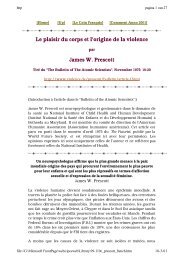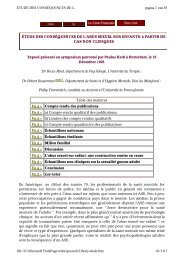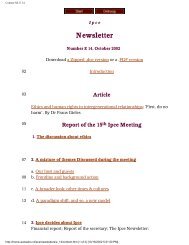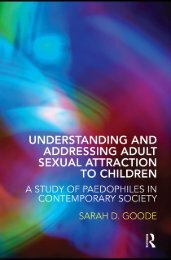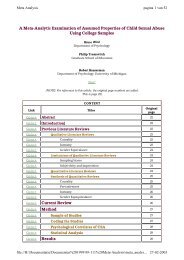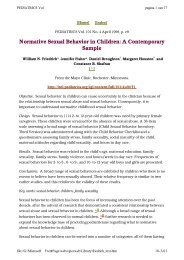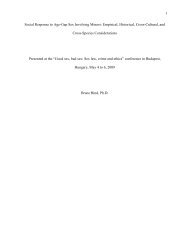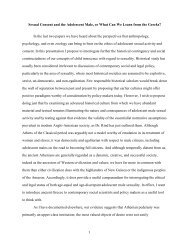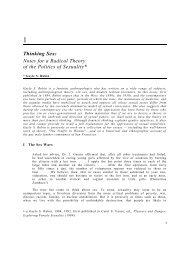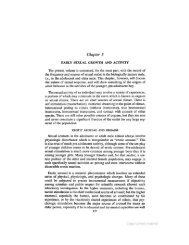Infant and Child Sexuality: A Sociological Perspective - Ipce
Infant and Child Sexuality: A Sociological Perspective - Ipce
Infant and Child Sexuality: A Sociological Perspective - Ipce
Create successful ePaper yourself
Turn your PDF publications into a flip-book with our unique Google optimized e-Paper software.
<strong>Infant</strong>s deprived of touch--holding, caressing, fondling--exhibit<br />
more than their share of violent-aggressive behavior <strong>and</strong> social-emotional<br />
disorders in later years. (Prescott, September 8, 1970). The<br />
reasonableness of this hypothesis has been supported in a number of animal<br />
studies of deprivation, notably studies of isolation-reared rhesus<br />
monkeys. When isolation-reared monkeys are brought together the first<br />
act of touching becomes a stimulus for violent-aggressive behavior.<br />
Dominant social characteristics of deprived animals include, besides<br />
violent-aggressive behavior, self-destructive biting <strong>and</strong> attacks on infant<br />
offspring. “Touching which is normally pleasurable <strong>and</strong> comforting<br />
becomes aversive, stressful, distasteful, <strong>and</strong> apparently painful.”<br />
(Prescott <strong>and</strong> McKay, April 1972, p. 2).<br />
If this is true of animals, Prescott <strong>and</strong> McKay (February 1973) suggest<br />
that something similar might also be true of children. They reason<br />
that human societies which are characterized by enrichment or<br />
impoverishment of the stimulation that comes from touch during the formative<br />
years of development would result in predominantly peaceful or<br />
violent adult behavior. In an ingenious, though at best partial, test<br />
of the hypothesis, Prescott <strong>and</strong> McKay examined published data on fortynine<br />
societies. It was assumed that high physical intimate affection<br />
would be predictive of permissive <strong>and</strong> tolerant sexual behavior in<br />
adulthood <strong>and</strong> that low physical intimate affection would be predictive<br />
of punitive <strong>and</strong> repressive sexual behavior in adulthood. The data, however,<br />
did not indicate a significant relationship between early infant<br />
affection <strong>and</strong> later permissive sexuality.<br />
Prescott <strong>and</strong> McKay returned to the data <strong>and</strong> asked if it could be<br />
possible that deprivation of affection imposed during the later formative<br />
period (denial of the right to premarital intercourse, for example)<br />
contributes to high adult violence despite the presence of high<br />
infant affection. An examination of seven societies that did not provide<br />
a high level of infant affection <strong>and</strong> yet had a record of low adult<br />
violence all were characterized by freely permitted premarital sexual<br />
behavior. Prescott <strong>and</strong> McKay suggest that the effects of early affectional<br />
deprivation might be compensated for by adolescent affectional<br />
permissiveness. According to Prescott <strong>and</strong> McKay, premarital sexual relations<br />
may constitute an effective prophylactic against later destructive<br />
<strong>and</strong> violent interpersonal behavior. When both early (infant) <strong>and</strong><br />
later (adolescent) affectional permissiveness or the lack of it were<br />
considered together, it was possible to accurately predict adult interpersonal<br />
behavior in forty-seven of the forty-nine societies studied.<br />
Prescott <strong>and</strong> McKay conclude that this data offers some compelling validation<br />
for the effects of affectional enrichment or deprivation on human<br />
behavior <strong>and</strong> indicates that a two-stage developmental theory of<br />
affectional stimulation, the first in infancy <strong>and</strong> the second in adolescence,<br />
is necessary to accurately account for the development <strong>and</strong> expression<br />
of peaceful or destructive-violent interpersonal behavior in<br />
adulthood.<br />
Affectional-sexual development, in comparison with other aspects of<br />
development--motor <strong>and</strong> language, for example--has been more often repressed<br />
than encouraged in the majority of families in the United<br />
States <strong>and</strong> throughout most of the western world. A traditional taboo<br />
surrounds the subject of infant sexuality despite the fact that healthy<br />
human offspring are endowed from birth with sensory <strong>and</strong> affectional impulses.<br />
In the United States sex is seldom treated as a strong <strong>and</strong><br />
22



